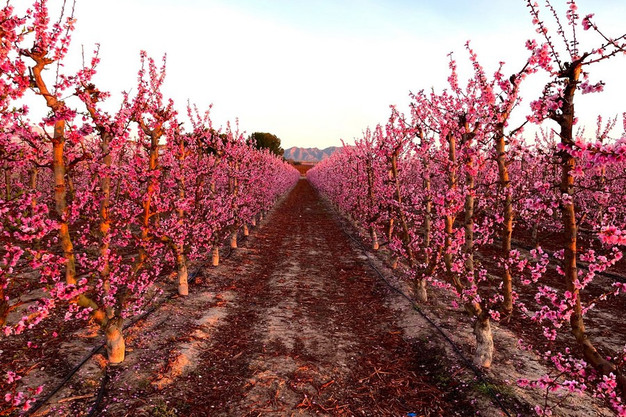The week has started with more rainfall in the Region of Murcia. "There has been a lot of rain in the northwest, and less in the Vega del Segura, but the good thing is that there haven't been any large downpours," says producer Miguel Ángel Piñera, head for stone fruit at COAG Murcia.
"Right now, in the Region of Murcia, 50% of stone fruit varieties are in full blossom. We believe that nectarines, flat peaches, and red peaches won't suffer any major problems due to the rains, as the pollination has not been affected; however, we do expect certain apricot varieties to be affected, especially those that are not self-fertile and need pollinators."

This is because the rain "washes" the pollen away from the flowers, and moreover, bees are unable to carry out their pollination work in rainy and windy conditions. "Another issue we'll have to deal with will be the fungal diseases caused by this moisture," he says. Preventive treatments are implemented when the rain stops, but constant rainfall prevents these treatments from being effective."
There is also concern about the presence of thrips, which have significantly affected citrus crops this year. "Up until last year, the insect could still be fought with some products available on the market, but this year there are fewer active ingredients allowed and we are lacking products to be able to tackle thrips in stone fruit. This year, with the traps distributed in the fields to detect its presence and count its population, we are already seeing that it's going to be a problem," says Miguel Ángel.
Stone fruit has a much more sensitive skin than citrus fruits or pomegranate, which already suffered the impact of thrips last year. "We still don't know what percentage of the fruit could be affected, but we expect the fruit's thinning to be carried out at a slower pace than usual, as we will probably have to sort out the fruit damaged by thrips."
For now, after a winter in which the trees in Murcia have had the right amount of chilling hours and blossom which, with the exception of some apricot varieties, has gone well, "everything points to this being a normal season."
"What we do think is that the production could be slightly delayed compared to last year, although this is not something to worry about," says Miguel Ángel. "Hitting the market a few days earlier or later doesn't make that much of a difference. Based on previous experience, we know that the most important thing is for our fruit to arrive in the European market at a time when temperatures encourage consumption."
For more information:
COAG-IR Murcia
Tel.: +34 968 35 40 59
info@coagirmurcia.org
https://coagirmurcia.org
